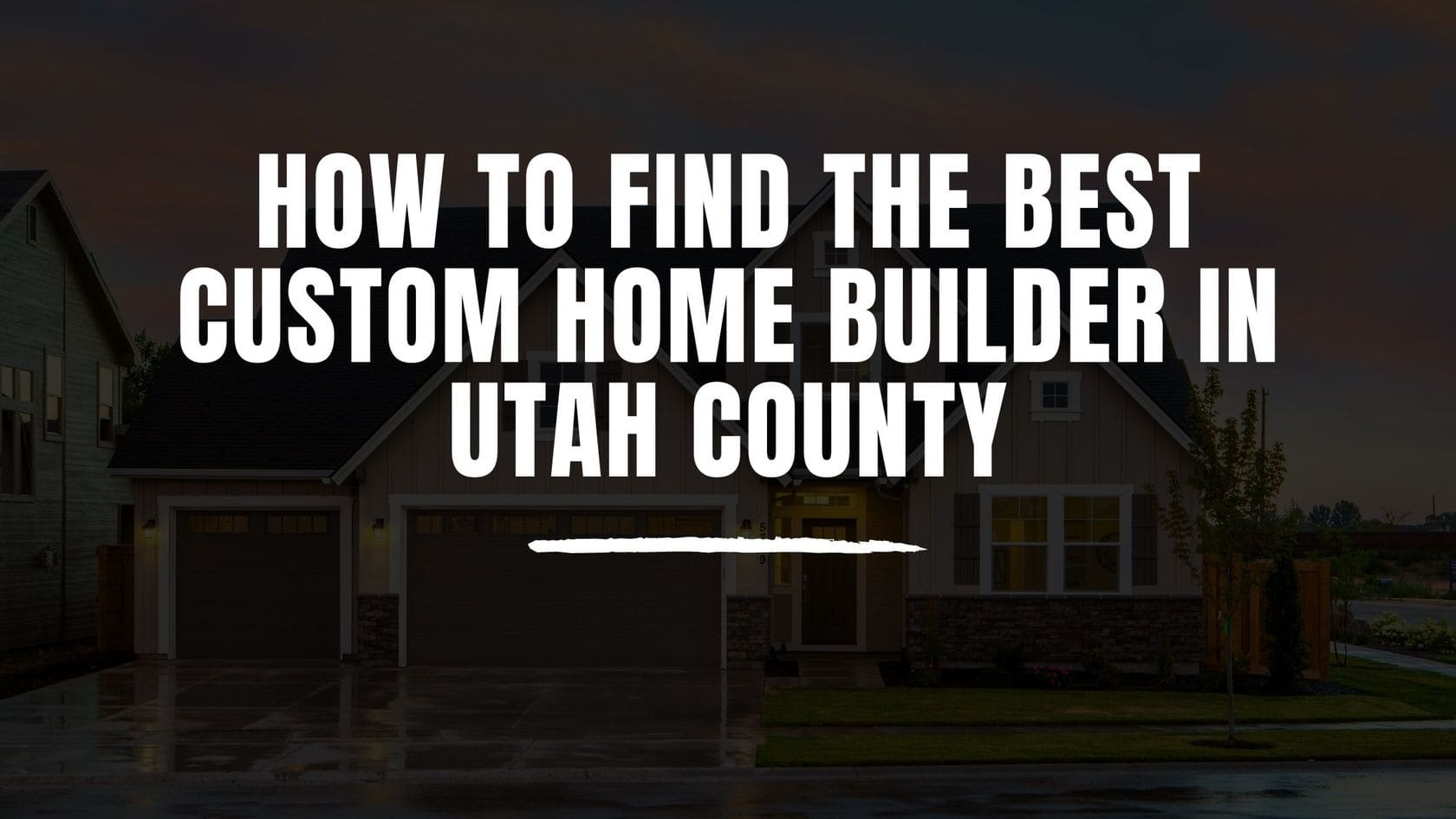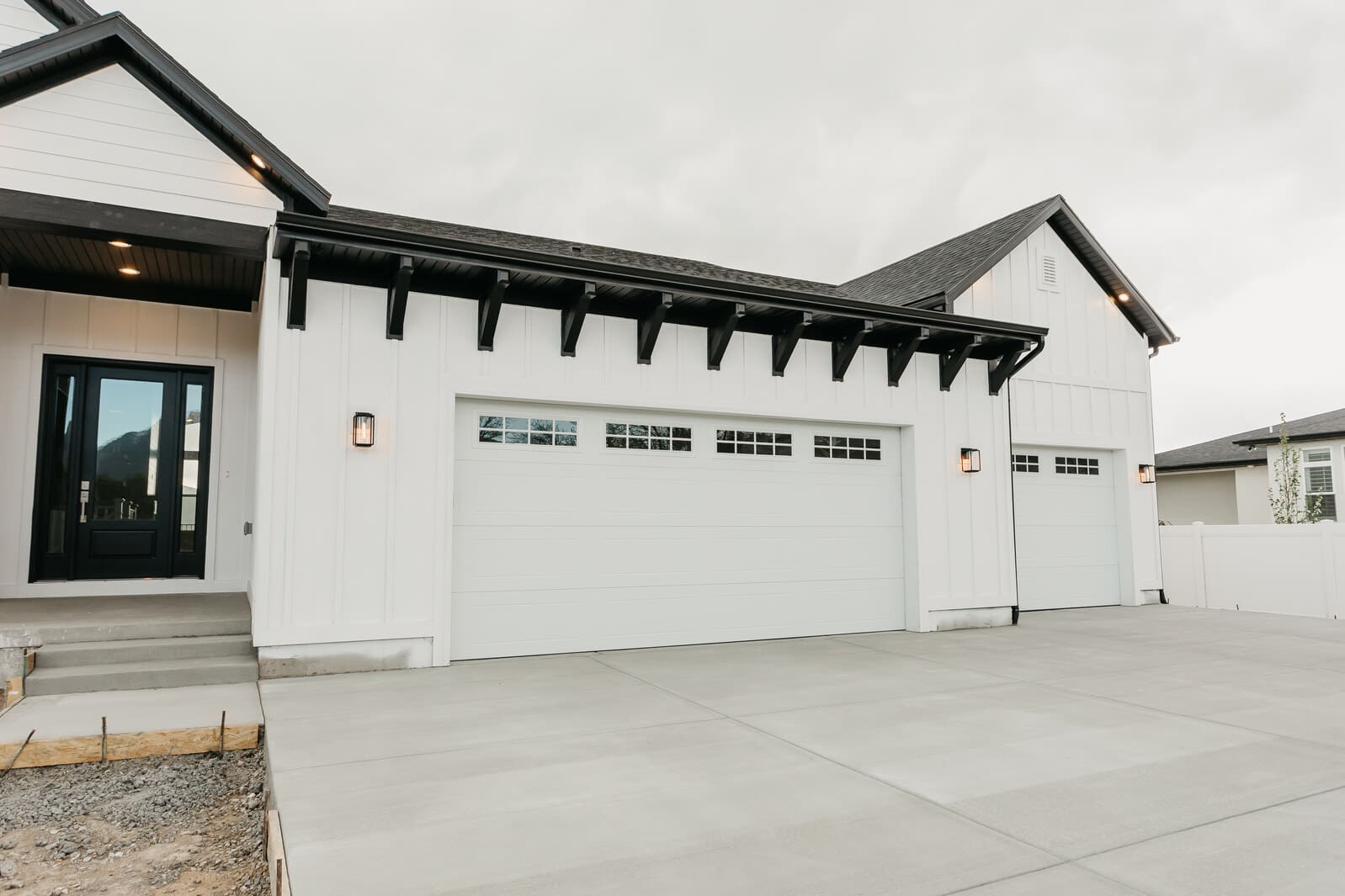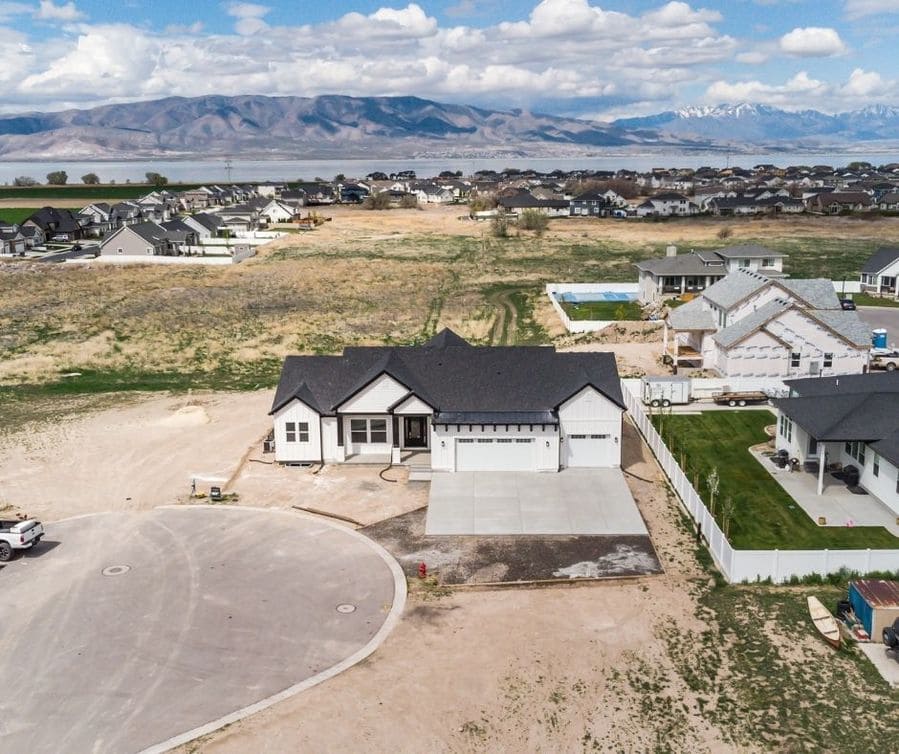
How To Find The Best Custom Home Builder in Utah County
Choosing the right custom home builder can make all the difference between a rewarding custom home building experience and a nightmare one. This blog post will help you feel more confident in your decision and bring you one step closer to a beautiful custom home in Utah County.
Getting The First Step Right
The first and most important step to finding the best custom home builder is to choose your builder BEFORE you begin working with an architect (or shortly after) and ideally before you choose the lot you want to build on. What does that have to do with actually choosing the right custom builder? Let’s discuss.
So many homeowners make the mistake of hiring an architect first, working on the design, then sending the plans to multiple builders to find the cheapest bid. There are three main problems with this approach:
Poor Incentive Structures
The approach described above, design-bid-build, incentives builders to cut corners or mislead prospects to win projects. For example, finishes and fixtures significantly affect the overall cost of your custom home. A dishonest builder might give you an estimate with the cheapest materials in mind to drive down the price tag and entice you with a low bid. In this scenario, you get halfway through your custom home and realize there’s a big gap in expectations between you and the builder; for example, you thought you were getting marble countertops and the builder only accounted for laminate.
You’re Almost Guaranteed To Get An Estimate Over Your Budget
If your architect isn’t working with a builder and getting feedback throughout the design process, you’ll likely be shocked when you get an estimate back that’s $100,000 more than what you expected.
So many homeowners fall into the trap of dreaming too big and designing a custom home that isn't practical within your budget. When your builder and architect are working together, the builder can provide feedback throughout the design process and ensure a successful project. They'll be able to advise the architect on the updated cost of materials and other costs that architects might not be aware of.
It’s Nearly Impossible To Get Apples-To-Apples Bids
Unless every tiny detail is outlined by the architect, each builder will read your plans differently. So when you’re comparing the different estimates and trying to decide which builder to go with, you might be looking at completely different interpretations of your home. Remember, details matter and there are lots to account for when building a custom home.
The Best Custom Home Builders Will Help You With Every Stage Of The Custom Home Building Process
The best builders want to work with your architect and serve as a practical sounding board throughout the design process. This will ensure your project stays within budget, on schedule, and it also opens up new possibilities and perspectives. If you’re only reaching out after the design, your builder becomes more of an order-taker than a collaborator. To extract as much value from your builder as possible, make sure they are working with your architect as early as possible.
Many homeowners have faced the unfortunate situation of dreaming up a beautiful custom home with an architect only to find out it’s $100,000-$200,000 more than they expected. By involving both your builder and architect from the get-go, you dramatically reduce the chances of this happening.

Finding The Best Custom Home Builder In Utah County For You
Now that we’ve discussed the importance of finding your builder as early as possible, let’s discuss how to actually find the right builder for you.
Research
The best place to start is in your personal network. Ask your friends, family, or even current neighbors if they have any recommendations. You should start seeing some common names pop up that will guide your search.
If you don’t currently live in Utah County, Google, and other search engines are an excellent resource. You can start your search by typing in “Custom Home Builders in Utah County” or swap out Utah County for the city name you want to build in. From here you’ll find 5-10 options to look at and explore. If you go to a builder's website and you like what you see, go back to the search results and type their name into Google. By doing this you’ll be able to see all of their customer reviews on multiple websites such as Houzz, Yelp, Facebook, and many more. This way you’ll get the full picture and not just what they decide to share on their website.
Through this process, you should be able to narrow the decision down to two or three builders.
Interviews
If this is your first time building a custom home, interviewing builders can be overwhelming. The custom home building process is very unique and each builder you talk to will have a different process and approach. With that being said, there are a few characteristics that all good builders will have: organization, clear communication, ability to articulate the process, multiple past projects to show you, and multiple past clients for you to talk to. Ideally, you’ll also be able to walk through a current project or two to see how they take care of their job sites.
Here are a list of specific questions you can ask each builder:
Do you handle design in-house or partner with architects?
This will help you understand if they are a design-build firm or just a custom home builder. There are certainly benefits to both approaches and the right choice typically depends on the scope of your project and the level of expertise.
Generally speaking, bigger projects (custom homes) are executed by an architect and builder, whereas small to mid-size remodeling projects are typically executed by design-build firms.
Do you have experience working with architects?
This is a good follow-up question if they are not a design-build firm (although some design-build firms still work with architects). Hiring a builder with experience working with architects is crucial to a successful custom home building process. A builder who doesn’t work well with architects will likely lead to excessive change orders, delayed project finished dates and an overall lack of satisfaction.
How can I monitor the progress of my project?
Most good builders today use project-management software to help simplify the home building experience for their customers. The most popular project-management software for custom home builders is Buildertrend and CoContruct, but there are other viable options out there. It doesn’t matter which tool they use, it matters how they use it. When used correctly, you’ll be able to get weekly updates, make change orders, make material choices, and much more all from your phone or computer.
Make sure you ask your builder which software they use and the different functionality this tool gives customers.
How do you handle change orders or disruptions in the supply chain?
This question is especially relevant at the time we write this post (June of 2021). As you’ve likely seen, lumber prices and other material costs have been increasing each month this year (although it looks like it’s beginning to trend in a better direction). In times like these, it’s very important that you talk with your builder about how they plan to handle these fluctuations. Make sure they explain which type of contract they use (cost-plus or fixed price) and if they plan on using an escalation clause.
A good builder will be able to clearly communicate how they’re handling these situations and why they use their type of contract.
Do you use subcontractors? How do you ensure quality?
Builder-subcontractor relationships are extremely important, especially for custom homes. You need to make sure that your expectations of quality are clearly communicated across all different entities working on your project. Ask your builder which subs they work with and if they’ve used them in the past. Depending on the size of the company, they might handle all work in-house.
What happens if we change the design direction halfway through?
It’s best to avoid changing direction mid-project if possible, but we understand that’s not always the reality. For this reason, it’s important to establish how you’ll talk about change orders, how you’ll weigh the pros and cons, and how you’ll submit requests when interviewing each builder. Make sure your builder has a plan in place to transparently document changes and update you on the cost of your project. Most builders will use project-management software like Buildertrend or CoConstruct to track these changes.
Do you offer a builder’s warranty?
Most custom home builders offer one to two-year warranties on their homes.
Questions To Ask References
If you like all the answers you hear from the questions above and you think they’re a good fit, ask to speak with 2-3 references. They’ll be able to speak to the quality of craftsmanship, communication, and overall satisfaction of their project.
Here are a few questions to ask each reference:
- Why did you choose (insert builder name)
- Would you work with them again?
- How responsive were they to texts, emails, and calls?
- How did they update you on the status of your project?
- Was your project finished within budget and timeline?
- Did they clearly explain the building process to you?
- What roadblocks did you encounter and how did they help you overcome them?
You can also use this time to fact-check the answers to questions asked during the interview process. After speaking with 2-3 references you should notice some patterns and have a good sense if this is the right builder for you.

Final Thoughts
At the end of the day, you need to hire a custom home builder you can trust. You want someone with expertise, experience, excellent communication skills, and patience. The custom home building process is a long journey that requires lots of patience from both sides. Spending the time to properly research and vet each builder you’re considering will save you lots of time and money in the long run and get you one step closer to a beautiful custom home you can’t wait to show off.
Want To Talk About Building A Custom Home In Utah County?
We’d be honored to talk with you about your project. Give us a call at 801-803-8931 or fill out a contact form on our website.

